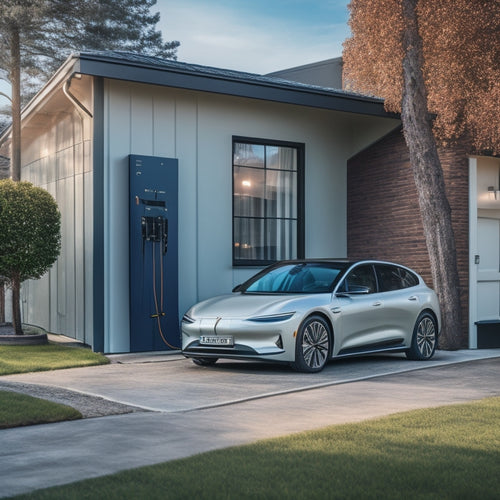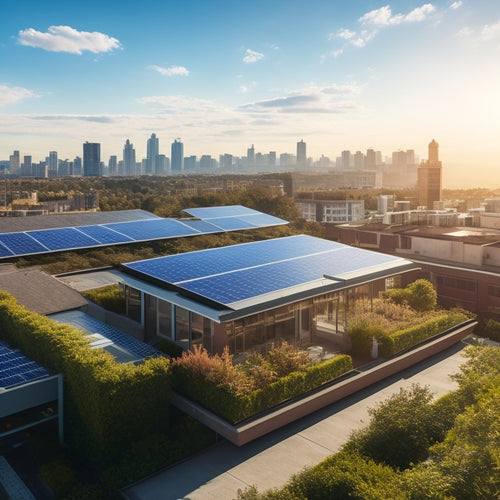
Key Considerations for Roof Top Solar Panel Installation
Share
When considering rooftop solar panel installation, you'll need to assess your roof's condition and age, guaranteeing it can support the weight and installation process. You'll also need to determine the ideal system size and layout based on energy needs, roof space, and local codes, while considering panel efficiency, orientation, and shading obstacles. Additionally, you'll want to investigate budgeting and financing options, comply with local building codes and permits, and plan for ongoing maintenance and repairs to guarantee peak performance. By carefully evaluating these key considerations, you'll be well on your way to a successful and lucrative solar panel installation.
Key Takeaways
- Assess the roof's condition and age to ensure it can support the weight and installation of solar panels.
- Determine the optimal solar panel system size and layout based on energy needs, roof space, and local codes.
- Explore budgeting and financing options, including incentives, loans, and lease agreements, to make the project financially feasible.
- Ensure compliance with local building codes and permits by researching regulations and submitting detailed installation plans.
- Develop a maintenance schedule to ensure peak performance, including regular cleaning, monitoring, and inspections to address potential issues.
Assessing Roof Condition and Age
Before installing rooftop solar panels, assess your roof's condition and age to confirm it can support the additional weight and withstand the installation process.
You'll want to verify your roof's structural integrity can handle the added load of the solar panels, mounting hardware, and other equipment. Start by inspecting your roof's materials, such as asphalt shingles, metal, or tile, to identify any signs of wear, damage, or degradation.
Check for curled, buckled, or missing shingles, as well as rust or corrosion on metal roofs. Verify that your roof's framing and decking are sturdy and securely fastened.
Additionally, examine your roof's age and historical maintenance records to determine if it's due for replacement or repair. A thorough assessment will help you identify potential issues and determine the necessary repairs or upgrades before installing solar panels.
This vital step will prevent costly surprises, guarantee a successful installation, and confirm your solar panel system operates efficiently and safely.
Solar Panel System Size and Layout
With your roof's condition and age assessed, you can now focus on designing an ideal solar panel system. The system's size and layout are critical factors in maximizing energy production.
You'll want to determine the best system size based on your energy needs, available roof space, and local building codes. A larger system doesn't always mean more energy production; consider factors like solar panel efficiency, installation orientation, and shading obstacles.
Orienting your solar panels between 15° and 40° will guarantee the best energy collection. South-facing installations are ideal, but west- or east-facing orientations can also be effective.
Confirm your system is designed to accommodate potential shading from trees, vents, or other obstructions. A well-designed layout will minimize energy losses and enhance your return on investment.
Consider consulting with a professional to verify your system is fine-tuned for maximum energy production. By carefully considering these factors, you'll be well on your way to utilizing the full potential of your rooftop solar panel system.
Budgeting and Financing Options
Your solar panel system design is taking shape, and now it's time to focus on the financial aspect. As you're considering roof top solar panel installation, budgeting and financing options are vital to make your project a reality.
You'll need to investigate available incentive programs, such as tax credits, to reduce your upfront costs. Loan options are also available, allowing you to finance your solar panel system and repay it through your energy savings.
Another option is lease agreements, where you pay a monthly fee to use the system, but don't own it. It's important to evaluate these options carefully, considering factors like return on investment, energy savings, and system maintenance costs.
Local Building Codes and Permits
Beyond the financial considerations, roof top solar panel installation requires compliance with local building codes and permits, guaranteeing your system meets safety and performance standards.
You'll need to research and comply with local zoning regulations, which may dictate the size and placement of your solar panel array. Additionally, you must obtain necessary permits from your local government before commencing installation. These permits typically require submission of detailed installation plans, including system design, electrical connections, and structural integrity assessments.
Your solar panel installer should be familiar with local building codes and permits, but it's essential you understand the process as well. Confirm your installer provides you with a thorough installation plan, outlining how they'll meet local building codes and regulations.
Be aware that failure to comply with local regulations can result in fines, system shutdown, or even removal. By understanding local building codes and permits, you can avoid potential pitfalls and guarantee a safe, efficient, and compliant roof top solar panel installation.
Ongoing Maintenance and Repair
Solar panel systems require regular upkeep to guarantee peak performance and prolong their lifespan. You'll need to develop a maintenance schedule to make certain your system operates at its best. This includes cleaning techniques to remove dirt, debris, and other obstructions that can reduce energy output.
You should clean your panels every 6-12 months, depending on the environment and weather conditions.
Performance monitoring is also vital to identify any issues early on. You'll need to keep track of your system's energy output and compare it to the expected performance. This will help you detect any potential problems, such as faulty inverters or damaged panels.
Regular inspections can also help you identify loose connections, corrosion, or other signs of wear and tear. By addressing these issues promptly, you can prevent minor problems from becoming major repairs.
Frequently Asked Questions
Can I Install Solar Panels on a Metal Roof?
You can install solar panels on a metal roof, but you'll face unique installation challenges, such as ensuring a secure attachment system; however, metal roof benefits, like durability and water-tightness, can make it a great option for capturing solar power.
How Long Does a Typical Solar Panel Installation Take?
As you commence on your solar expedition, imagine a skilled chef preparing a culinary masterpiece - it takes time, precision, and planning. Your solar panel installation timeline typically spans 3-5 days, but project preparation, including permits and inspections, can add 2-4 weeks to the overall process.
Do Solar Panels Work During a Power Outage?
You'll be pleased to know that solar panels don't provide power during outages without a solar battery storage system, but with one, you'll enjoy grid independence, ensuring your lights stay on when the grid goes dark.
Can I Install Solar Panels Myself to Save Money?
You're considering a DIY installation to save money, but be aware that improper mounting, electrical connections, and permits can lead to safety risks, voided warranties, and reduced efficiency, potentially offsetting any cost savings.
Will Solar Panels Void My Roof's Warranty?
As you imagine utilizing the sun's energy, you wonder: will solar panels void your roof's warranty? Rest easy, you're not alone. Typically, solar panel warranties won't void your roof warranty, but it's essential to review roof warranty implications before installation to guarantee a harmonious coexistence.
Related Posts
-

10 Essential Bike Lane Safety Features to Consider
You're designing a bike lane with safety in mind, and that's essential. The National Highway Traffic Safety Administr...
-

5 Essential Tips for Buying EV Charging Systems Online
When purchasing an EV charging system online, you'll want to make sure you're making an informed decision. First, det...
-

What Is the Cost to Put in Solar Panels
You're likely considering solar panels for your home, and the most significant factor in your decision is the upfront...


